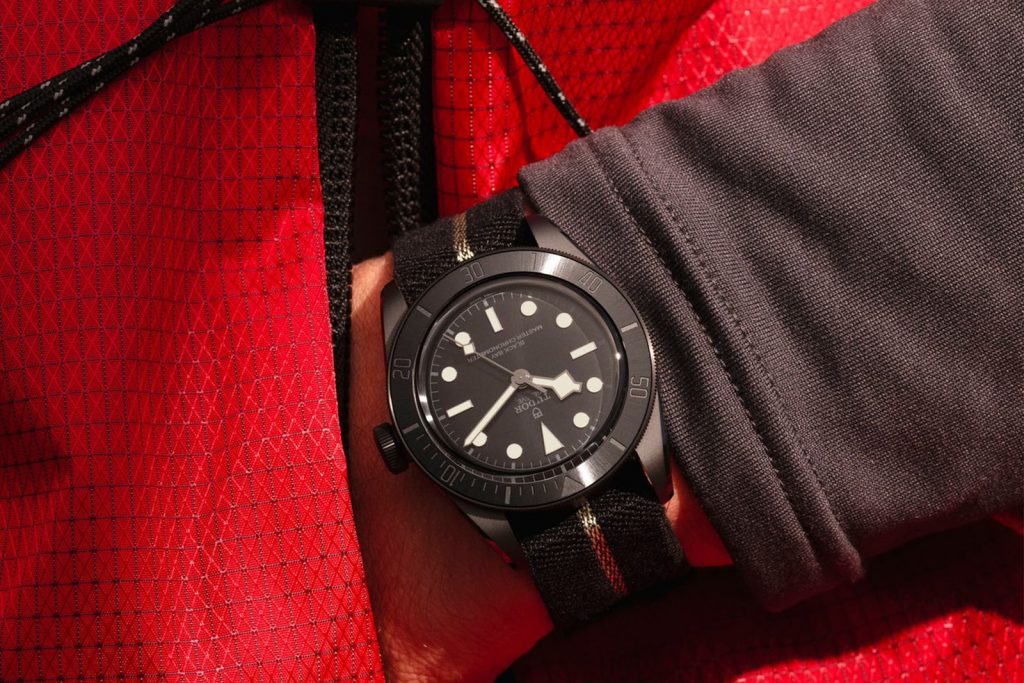You may recognise the term “Master Chronometer”. In all likelihood, you’ll only ever have seen it on Omega replica watches online store, which has been alone in using the words on a watch dial since it placed them on the first Globemaster of 2015. But after six years, that hegemony is over. Today, Tudor replica has announced the Black Bay Ceramic, its own Master Chronometer.

If that seems like a shortcut to a battle over intellectual property rights, it isn’t. The term Master Chronometer is, by degrees, the property of the Swiss government, rather than Omega. It was coined in 2014 after fake Omega worked with Switzerland’s Federal Institute Of Metrology, known as Metas, to develop a broad certification that would set its watches apart from those carrying what it saw as the wornout “chronometer” tag.
As such, and unlike the self-certified Patek Philippe Seal, no one brand owns the term. Testing is independent and open to anyone. Should there be any confusion, it’s because it’s taken so long for another Swiss watch brand to make a watch that qualifies. If that singles out Tudor’s new piece as special, it should also give us an idea of how advanced Omega’s current collection is. The vast majority of the estimated half a million pieces Biel’s finest makes a year are certified as Master Chronometers.
What makes a Master Chronometer hasn’t changed. Tudor’s novelty, which is also the brand’s first watch with a monobloc ceramic case, has passed the same eight punishing tests as Omega’s, including those for accuracy, autonomy, water-resistance and – the big one – anti-magnetism to 15,000 gauss.
Where it does get confusing is that because not all of those tests are done to preordained parameters, the Black Bay Ceramic’s performance is not exactly the same as say, replica Omega’s Speedmaster Professional Co-Axial Master Chronometer. While a Master Chronometer must be accurate to 0/-5 seconds a day, it only has to be water-resistant and to have a power reserve as advertised by its makers. That means the cheap copy Tudor Black Bay Ceramic has passed Metas’ tests that legitimise Tudor’s claims of 200 metres of water resistance and 70 hours of power reserve.
The meat of the certification though, remains in tests for accuracy and anti-magnetism. A standard chronometer (and Metas will only test watches that have already been certified as chronometers) is accurate to -4/+6 seconds a day and, even then, that only applies to the movement before it’s put into a watch case. Master Chronometer testing is of the fully cased movement – the watch you put on your wrist, bar the strap – and demands twice the accuracy.
That 15,000 gauss anti-magnetism rating is reassuring, too. Watch manufacturers report that the majority of slow-running watches returned to them have been magnetised, often, no doubt, by owners who leave their watches next to their charging phones overnight. That won’t be a problem with the black dial replica Tudor Black Bay Ceramic. At launch, Omega said its Master Chronometer watches would keep ticking uninterrupted even if they were subjected to an MRI scan, where magnetic fields are around 13,000 gauss. Tudor, a touch surprisingly, is saying the same.
What it’s not saying is what’s gone into the watch’s movement to prevent its parts from being magnetised. Tudor’s Calibre MT5602-1U (“U” because it looks like a magnet – a nice bit of whimsy) has a silicon hairspring, a tungsten rotor and ceramic ball-bearings, but beyond that, the brand is keeping its counsel on the magic ingredients that make the movement so resistant to magnetic fields. Super clone Omega UK, for the record, is just as tight-lipped, but there’s no suggestion the two have shared technologies in the way Breitling and Tudor have swapped movements in the past.
Forgetting the aesthetics of an all-black ceramic watch for a moment, and that the Black Bay Ceramic is the most advanced Tudor replica watches with Swiss movements and black ceramic case has ever made, this is an interesting development for Swiss watchmaking. You suspect there might be some at Omega replica watches who will shed a tear at having to share the certification after having it all to themselves for so long. But the reality is that Tudor’s successful application further legitimises the certification and will bring it to the eyes of more consumers. If and when others do the same (it’s hard to see Rolex following in the footsteps of its little brother, but surely Breitling, IWC and other toolwatch specialists would benefit), they’ll legitimise it further still. For Swiss watchmaking and its consumers, today’s news should therefore be all to the good.
We’re not quite comparing apples with apples here, though. There is a twist. Tudor’s all-ceramic Master Chronometer, which comes with two straps, is £3,550. Omega’s all-ceramic Seamaster 300 Master Chronometer is £6,950. Let battle commence.
